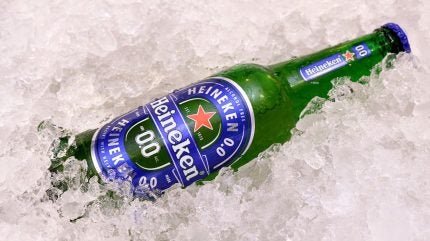
While still a small part of the global alcoholic drinks industry, the market for non-alcoholic alternatives continues to grow – and continues to attract investment from the industry’s major players.
Recent market analysis from GlobalData, Just Drinks’ parent, suggests the value of the combined, global, non-alcoholic beer and cider market will reach $11.6bn by 2027, growing roughly 16% on what is forecast for 2024.
Non-alcoholic spirits is a smaller market but is forecast by GlobalData to see greater growth, being forecast to increase 36.7% in value between 2024 and 2028, to $478.9m.
Big players in alcohol have taken note, and growing numbers have now made significant moves in the space: be it through M&A, developing brand extensions, launching standalone non-alcoholic products, or making investments in specialist facilities and technologies.
When it comes to commitments to growing the no-and-low category within their own portfolios, not all brewing and distilling heavyweights have established clear targets around sales or volumes. While some are clear on their expectations for the segment, others prefer to remain cautious, committing to investing in brands and technology but not with any specific goals in mind.
Here, Just Drinks presents a rolling guide of how some of the industry’s heavyweights are looking to tap into the growing interest in no-and-low.
Asahi Group Holdings
Non-alcoholic drinks play a major role in Asahi’s corporate vision.
As part of its Legacy 2030 strategy, the company is looking to have 20% of its group-wide portfolio made up by non-alcoholic and low-alcohol products in six years’ time. Meanwhile, the group’s domestic alcohol business Asahi Breweries is aiming to have 20% of its sales volumes made up by drinks with 3.5% abv or less by next year.
At the end of the first half of 2024, low- and no-alcohol products made up 12.1% of total sales, Asahi CEO Atsushi Katsuki told Just Drinks in a recent interview.
Asahi’s moves in M&A around in no-and-low alcohol have been few and far between but Katsuki said the group “would like to” boost its investment in what he calls the “beer-adjacent” category, which includes non-alcoholic beer and RTDs but also soft drinks targeted at the adult market.
One of the group’s most recent M&A ventures in the area was in January 2024, when its US-based venture capital arm Asahi Group Beverages and Innovation contributed to a Series A funding round for non-alcoholic drinks retailer The Zero Proof.
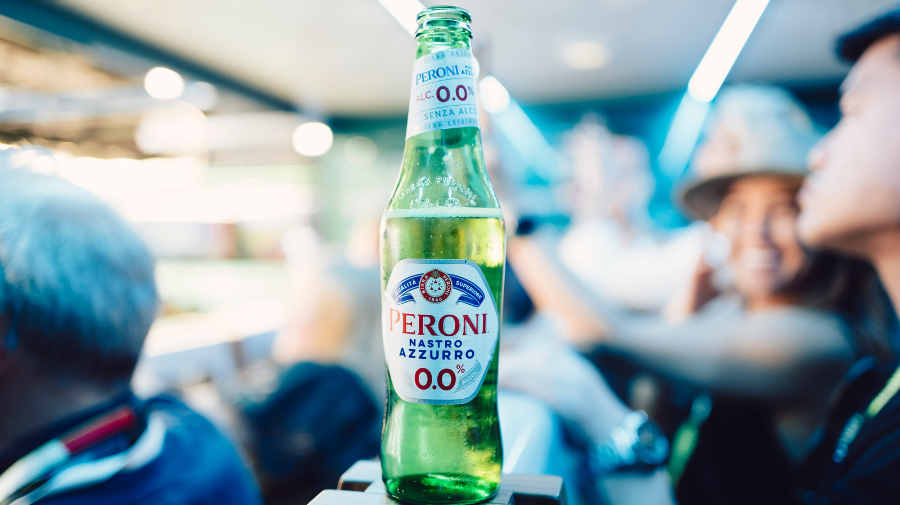
The Peroni brewer did not confirm the amount it had invested at the time but The Zero Proof noted in a separate statement that the company had “led” the round.
The US-based retailer imports and distributes a range of alternatives to full-strength alcoholic beverages. These include the likes of Oceano Zero, Oddbird and Noughty non-alcoholic wines, and Ish, Lyre’s and Pentire 0% spirits. It also provides a wholesale service to on- and off-trade businesses in the US.
Speaking to Just Drinks in the interview, Katsuki said that the company was in discussions with “a few hundred” startups though its US investment unit. He added that the company wanted to “continue to be proactive” in investing in start-ups in the beer-adjacent space, “even if we were to only take a minority stake”.
Much of Asahi’s investment has been to launch non-alcoholic versions of its major beer brands, including Peroni Nastro Azzurro 0.0% and Asahi Super Dry 0.0%.
Diageo
UK-headquartered alcoholic drinks giant Diageo has invested significantly into its non-alcoholic brand extensions – from zero alcohol Captain Morgan’s and Tanqueray to Guinness 0.0, among many others.
The group’s moves in no- and low-alcohol are a part of its Spirit of Progress ESG plan, but similar to other major drinks groups, the company is not looking to achieve a specific sales target with its low and no portfolio. In its 2024 annual report, the group said it looks to “enable and reinforce the breadth of choices that consumers have to moderate” in order to push “positive drinking attitudes and behaviours”.
In July last year, the group announced it was investing €25m to boost production capacity for the non-alcoholic variant of its Guinness Stout at its St. James’s Gate site in Dublin, Ireland.
The group plans to build a two-story facility with six processing vessels and a total capacity of 500,000 hectolitres. It claimed at the time that the move would help to boost production capacity of non-alcoholic Guinness by 300%.
At the time of the announcement last year, the group said it was hoping to see the non-alcoholic stout make up 10% of total Guinness sales in Ireland “over the next few years”. As of September 2024, Guinness 0.0 is sold on draught in over 1,6000 on-trade sites across both Ireland and Northern Ireland. According to the group’s 2024 annual report, Guinness 0.0 presently makes up around 3% of total global Guinness volumes.
The company began the first official draught trials for the drink in the UK in the on-trade in September, starting with a small number of pubs in London, including the Devonshire in Soho.
Anna MacDonald, Guinness marketing director for Diageo’s Great Britain branch said at the time that the company was planning on bringing the 0.0 drink to more pubs nationwide “as the year continues”.
Diageo has active when it comes to M&A in the emerging area of no-and-low.
Seedlip, which is now probably one of the most well-known global alcohol-free spirits on the market, launched in 2015. The following year it was brought under the group’s accelerator wing Distill Ventures, and in 2019, the group acquired the company for an unknown figure.
The Don Julio Tequila owner’s more recent investments into the non-alc category include New Delhi-based V9 Beverages, which the company’s Indian business, United Spirits, took “strategic minority investments” in earlier this year. It acquired a 15% stake in the group for Rs22.9m ($272.3m).
Set up in 2020, V9 Beverages’ alcohol-free spirits includes the Sober Gin, Sober Whiskey and Sober Rum variants.
Most recently in September, the Tanqueray distiller acquired US-based non-alcoholic spirits group Ritual Zero Proof for an undisclosed sum. The company, which sells its products across the US in-store and online, produces a five SKUs range of Tequila, gin, rum and whiskey alternatives.
Similarly to Seedlip, Diageo first took a minority stake in the business through its accelerator arm Distill Ventures in 2020.
At the time, the London-headquartered group said the move was “in line with Diageo’s strategy to acquire high-growth brands in exciting categories”.
In addition to investments in its own brands, production and M&A, the group has also delved into sports partnerships with its 0.0 stout. While Guinness was the official sponsor for the Six Nations Rugby tournament since 2019, as of June 2024, the non-alcoholic variant was made the official beer partner for the English Premier League.
Pernod Ricard
The Paris-headquartered company’s non-alcoholic portfolio is made up of a mixture of brands and brand extensions. The group’s entry into zero-alcohol goes as far back as 1982, with its launch of Pacific non-alcoholic anis. More recent additions to the portfolio include Swedish Ceder’s botanicals-based spirit which it acquired in 2021, Jacob’s Creek Unvined wine, and the Suze Tonic 0% beverage which is exclusive to France. Earlier this year, the group also launched a 0.0% variant of Beefeater gin, currently only sold in Spain, accompanying the 0.0% variant of Seagram’s which has also been sold there since January 2023.
Pernod has also dabbled in some investments in the non-alcoholic space, particularly in agave-based and ready-to-drink spirits alternatives.
In August, the group took a minority stake in Lewis Hamilton-backed agave-based spirit Almave. The two SKUs range was developed with Mexican spirits producer and incubator Casa Lumbre and investment firm Cooper. It launched last year, and is currently available in the US, Canada and selected European markets, including the UK, Ireland and Germany. Speaking with Just Drinks in September, Casa Lumbre said it was hoping to see the brand enter the UAE next year.
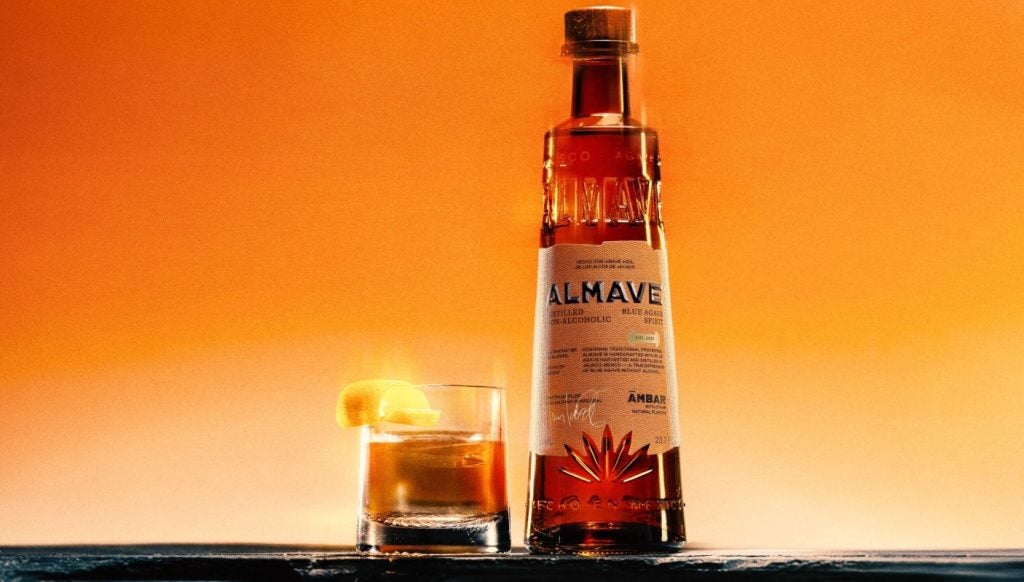
In 2023, the Chivas Regal distiller also injected an undisclosed sum into AF Drinks, a New Zealand-based non-alcoholic RTDs producer. The investment was made through its investment leg Convivialité Ventures. AF Drinks produces a range of canned non-alcoholic variants of popular mixed drinks, including a Grapefruit Margarita, Dark & Stormy and Cuba Libre. The Auckland-based group sells in New Zealand and the US, where it is known as Free AF.
In September 2023, the Codigo Tequila distiller’s venture capital branch also contributed to the non-alc retailer Boisson’s $5m bridge funding round.
While the Absolut vodka owner has no specific set goals, its intention to grow the performance and potential of its non-alcoholic drinks is clear, given the group established a specialist business unit for the category in 2022, based at its headquarters in Paris.
In its most recent annual report for 2023, the group said the unit was to focus on utilising “expertise in marketing, insights, operations and business development”. The group also notes that it has made investments “in new technical facilities dedicated to accelerating our expertise” in non-alcoholic spirits. The Jameson whiskey maker does not disclose the amount it invests in the non-alcoholic space.
Anheuser-Busch InBev
Belgian and US brewing major Anheuser Busch InBev (AB InBev) is another brewer that homed its focus in on in the non-alcoholic category.
The Leffe brewer has increased the number of no-and-low alcohol beer products in its portfolio by 60% and volumes by more than 23% since 2019.
When it comes to the group’s strategy, AB InBev does not actively share a specific no- and low-alcohol growth target. In 2022, reports from Reuters indicated the company believed it was already set to miss its goal of having 20% of global sales made up of no- and low-alcohol beers by 2025.
In April, group global vice president of corporate affairs Andres Peñate told journalists at its headquarters in Leuven, Belgium, that the business did not expect to hit that 2025 target, but it was “closer than yesterday”.
The no and low segment sits under its ‘occasions development’ focus category, as a part of its goal to ‘lead and grow the category’ of beer. In its latest annual report for 2023, the Budweiser brewer said it was “expanding beer consumption beyond traditional occasions” with its zero-alcoholic products, “developing brands focused on the meals occasion” as well as “in the in-home occasion through our digital direct-to-consumer brands”.
Discussing the group’s confidence in no and low in Belgium earlier this year, CEO of the company’s European arm Jason Warner said AB InBev saw “a unique opportunity” in positioning its non-alcoholic beers in the “adult refreshment” space, with growth of non-alcoholic beers being seen more and more outside of “traditional beer consumption moments”.
In 2023, the Jupiler producer made a €31m investment in the renovation of its non-alcoholic brewing technologies at its breweries in Sin-Pieters-Leeuw, Hoegaarden and Leuven in Belgium.
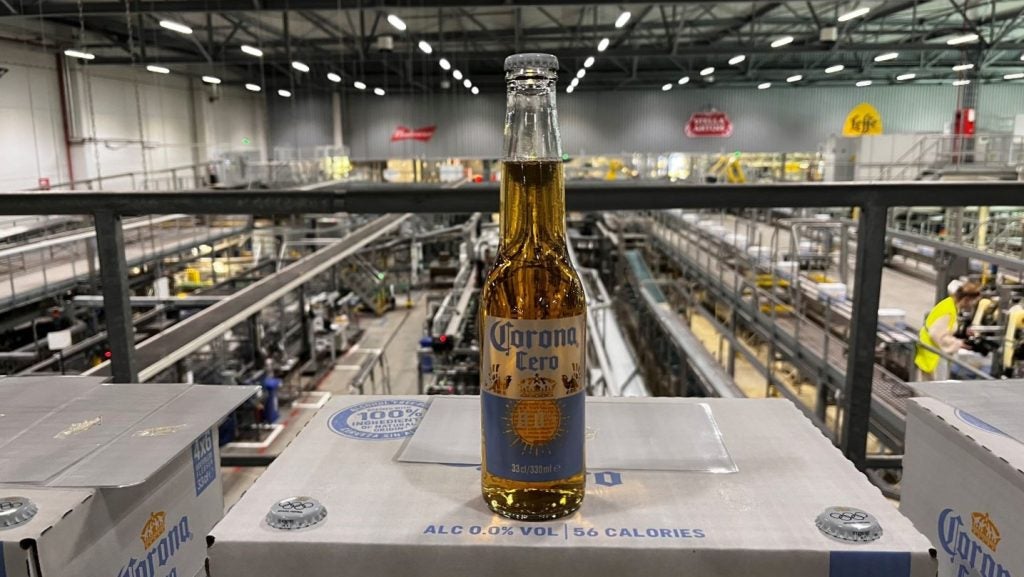
The money was to be used to help grow the brewing giant’s non-alcoholic portfolio, which includes zero-alcohol variants of Leffe, Hoegaarden, Stella Artois and Corona Cero, among others.
Warner told Just Drinks at group headquarters earlier this year that the group was also in the process of building up its de-alcoholisation tech in the UK.
“We have the de-alcoholisation plan here, we have one in Germany and we’re building one into the UK right now. We’re getting the necessary scale that we’re going to need.”
In 2024, the group has also struck a deal for Corona Cero to be the global beer sponsor for the Olympic Games through to 2028. Following the Paris edition earlier this year, the beer will also sponsor the games in Milano-Cortina in 2026 and Los Angeles in 2028.
The agreement, which was made for an unknown figure, is the International Olympic Committee’s (IOC) first TOP (The Olympic Partners) partnership with an alcohol brand.
Warner told reporters earlier this year in Belgium that Corona Cero “is a brand that’s really starting to get to scale. It’s growing fast and, since we’ve introduced this brand into non-alcohol, we are the fastest-growing lager brand in Europe”.
He also told Just Drinks that Corona Cero would be in 23 markets by the end of 2024, which includes a new entry into Italy.
When it comes down to M&A, the business hasn’t been as active in the no-alcohol category, preferring to home in on developing its own brand extensions. While already producing non-alcoholic variants of a number of its signature brands, in September, the group’s US arm, Anheuser-Busch, announced plans to roll out a 0.0% version of Michelob Ultra. The 0% abv Michelob Ultra Zero is to be available “wherever Michelob Ultra is sold” from January 2025.
Campari Group
Italian spirits giant Campari also sees non-alcoholic drinks options as a significant part of its business strategy, with a particular focus on non-alcoholic aperitifs.
In its 2023 annual report, the Aperol owner said one of its “key strategic priorities” was to “expand” its “leadership in Italian icons” through both its alcoholic and non-alcoholic portfolio.
The report notes: “the experience of the pandemic showed that consumer habits, the path towards the market and the assortment of brands may adapt in changing environments. Therefore, the Group feels the need to continuously evolve its strategy to be more agile, successful and sustainability-oriented.
“Recruiting new young customers and exploiting with courage emotional moments defined by social dynamics to discover the opportunities, geographical areas and categories of new consumers, is a ‘must-have’ to be fulfilled through the Group’s fantastic premium brands in the aperitif, amari and non-alcoholic segments”.
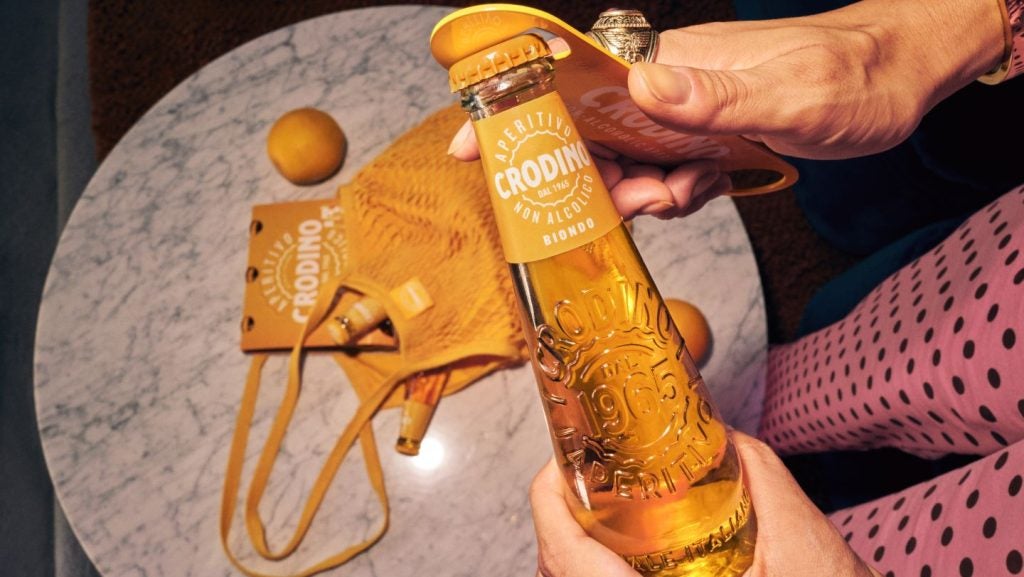
The Milan-headquartered company first entered the non-alc space in 1995 with its acquisition of the Italian 0% abv aperitif Crodino. The brand has been available in Italy since the 1960s, but the group has only more recently introduced the brand to new markets like Austria, Switzerland, France. Campari launched the drink in the UK in 2021.
Campari Group also has an independent non-alcoholic brand called The Notes, which launched in 2021. The brand is designed for use in the off-premise and is currently sold in Italy.
Bacardi
Privately-owned Bacardi was one of the early heavyweights to enter the non-alcoholic spirits category. Its first steps in the space were in 2020 with the launch of an alcohol-free Martini range in Europe which eventually made its way to North America in 2022.
While the company does not have any specific targets set in place around non-alcoholic drinks sales, they do feature in its most recent ESG report for 2024. Under its Good Choices pillar, which includes a commitment to cutting alcohol-inflicted harm and promoting responsible drinking, Bacardi notes that demand is growing for no- and low-alcohol drinks “as consumer adopt a more mindful approach to alcohol consumption”, and that it “continue[s] to deliver something for everyone” within its portfolio.
In 2021, the Aberfeldy distiller also worked outside of brand extensions with the pilot of its brand Palette. Speaking to Just Drinks earlier this year, the company’s head of innovation for western Europe, Marine Rozenfeld explained that the range would remain in France for now, noting that the group was mainly centring in on its alcohol-free Martini range.
Rozenfeld also spoke of how the group was seeing “the most traction” in lower alcohol options like its St Germain liqueur brand, which the company snapped up in 2013. It has also owned the lower-alcohol vermouth brand Martini Rosso since 1993.
“I think the products that enable you to make low alcohol [choices], like the St Germain spritz, [are] going to get more traction. [I’m] finding that middle ground in the low space is getting more traction than the no, versus what I’ve seen before”, she said.
Molson Coors
Increasing the level of non-alcoholic offerings is a key part of Canadian-American brewing giant Molson Coors’ strategy as well.
While the group doesn’t have a specific growth target for non-alc, the category does sit under its aims for its Beyond Beer portfolio, which includes flavoured hard seltzers, hard teas, spirts and its non-alcoholic products. The Chicago-headquartered brewer’s non-alc line features alcohol-free beer brand extensions for Blue Moon and Coors and non-alc ready-to-drink cocktails.
As part of its Acceleration Plan, brought into force in October 2023, Molson Coors is planning to “scale and expand” its Beyond Beer portfolio, and plans to have the range producing “about half of its Above Premium net sales revenue growth over the medium term”.
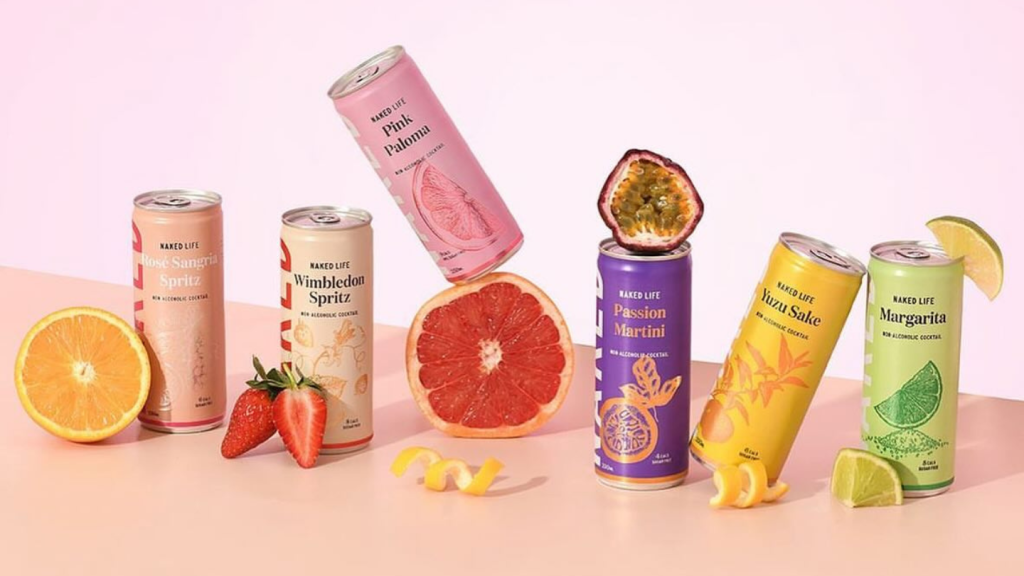
In September, the group also announced plans to partner with Australian non-alcoholic cocktail brand Naked Life, to help it launch in the US. The Coors Light brewer is to put five Naked Life cocktail drinks on the US market in 2025: the negroni spritz, margarita, gin & tonic, cosmopolitan and mojito variants.
At the start of 2023, the MillerLite brand owner also launched a non-alcoholic RTD called Roxie in the US. The range includes three SKUs in the flavours Forbidden Pineapple, Lost in the Mango and Ripe with Passionfruit.
Moët Hennessy Louis Vuitton (LVMH)
While non-alcoholic wine remains an emerging market, Moët Hennessy Louis Vuitton (LVMH) is among the major producers of conventional wine showing interest in the area.
The Moët et Chandon Champagne producer has made a recent move to dip its toe into the sector.
At the start of October, the Veuve Clicquot Champagne producer acquired a minority shareholding in France’s alcohol-free sparkling wine brand French Bloom. The group does not produce any non-alcoholic brand extensions or independent brands itself.
The brand was co-founded by Constance Jablonski and Maggie Frerejean-Taittinger in 2019, and currently sells its multi-SKUs range to 32 markets, including the US, Canada, UK, Australia and UAE.
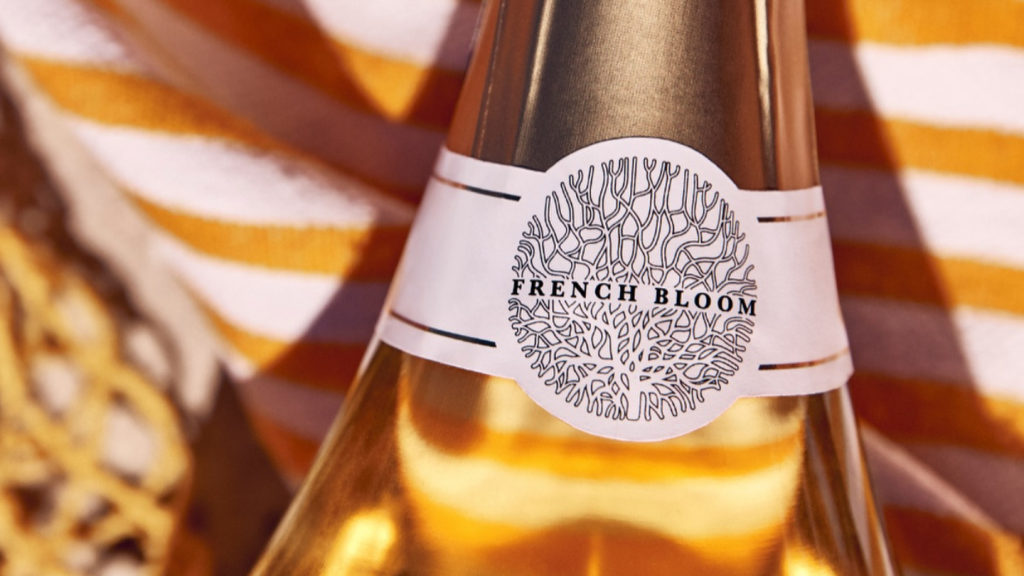
Commenting on the move at the time, CEO of LVMH’s wine and spirits division Moët Hennessy Philippe Schaus said: “This investment aligns with Moët Hennessy’s key strategic initiatives, demonstrating our commitment to offering high-quality alcohol-free choices to consumers who moderate their alcohol intake.
“We are confident that our expertise in wines and spirits, combined with French Bloom team’s exceptional innovation and visionary leadership, will enable us to craft the future of this category.”
Speaking to Just Drinks in May, French Bloom co-founder Frerejean-Taittinger said around “80% of our customers” in the markets where the company does business “are actually individuals who enjoy both alcoholic and non-alcoholic beverages interchangeably throughout their evenings, weeks, or months”.
She added: “They are ‘flexi-drinkers’ and interestingly, our core clientele reflect where I believe the wine market is going: drinking higher quality but less often.”
Heineken
When it comes to ventures in non-alcoholic beer, Heineken has been a long-standing player. The Dutch brewing major launched its 0.0 variant of its namesake drink in 2017 in the Netherlands and and Germany. Today, it is sold in more than 110 markets across Europe, North America, Africa and Asia-Pacific.
Heineken also manufacturers other non-alcoholic beer brand extensions, such as Sol Zero, Amstel Oro 0.0 and Birra Moretto Zero.
The group has also sought to offer its namesake non-alc brew on tap. It launched Heineken 0.0 on draught in the UK in 2021 and has a goal to have the same number of taps in pubs as there are taps of Heineken Original by 2025. It is also in the process of building draught listings in European markets including France, Italy, Spain and Germany.
To facilitate the push of putting 0.0 on draught, the Desperados producer developed an eight-litre Blade keg and 20-litre David unit. The company says the unit has a proprietary ‘BlueBird’ cooling innovation that helps to prevent the fermentation of alcohol-free beer once a keg is attached to a tap.
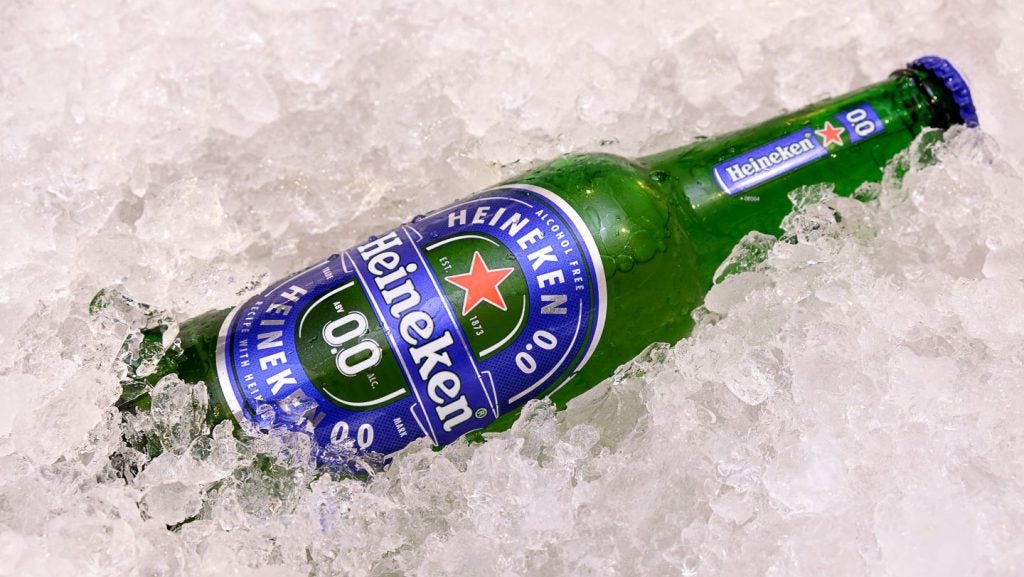
In October 2024, the Amstel brewer said it was still confident in the potential of its non-alcoholic business despite booking a 3.4% rise in volume sales in the third quarter of the year compared to the 14% seen in the first half.
When asked by Bernstein analyst Trevor Stirling whether the company thought the slowing growth indicated a “permanent change in momentum”, CFO Harold van den Broek said: “It was just a matter of not being at the right place, at the right time, with the right investment in some of these markets but nothing that structurally worries us. We do believe that this will pick up in the quarters to come.”
Speaking to analysts, van den Broek said non-alcoholic beer brands made up roughly 4% of the company’s global beer sales. He added that “over the next foreseeable future” the group expected the size of its zero range to increase “to about 6% or 7% of our total portfolio”.
In January 2025, Heineken published new research in collaboration with Ipsos and University of Oxford around consumer attitudes to low-and-no-alcohol.
The study, which includes responses from 11,800 people across the UK, the US, Spain, Japan and Brazil, found four in five consumers believe it is more acceptable to buy no-and-low-alcohol than five years ago but that peer pressure is holding back sales.
Over 80% of respondents said they believe drinking no-and-low options is more acceptable than years ago. More than two-thirds (68%) of respondents across the five countries reported they had tried no-and-low products.
Some 9% of respondents said they associated non-alcoholic drinkers with being ‘cool’ and 25% with being ‘respectable’. Meanwhile, 4% said they thought they were ‘uncool’ and 6% said they were ‘boring’.
Commenting on the research, Heineken chief corporate affairs officer Joanna Price said the results of the study showed “acceptability of 0.0 beer is at an all-time high”, but that “social stigmas still hinder our vision that everyone should always have a choice and should not be held back from choosing 0.0.”
In March the same year, Heineken expanded its range of Inch’s cider in the UK market with the addition of alcohol-free and cloudy variants. The company called Heineken “the first de-alcoholised cider in the UK”.
Concha y Toro
Chilean wine giant Concha y Toro announced its entry into the non-alcoholic segment in December 2024 with Casillero del Diablo Zero in the UK.
The alcohol-free sparkling wine alternative is made from 100% Chardonnay grapes grown in Chile’s Central Valley region.
The Trivento owner said it spent around a year developing the “gently dealcoholised” product through “extensive trials” led by Casillero winemaker Max Weinlaub.
To begin with, the new product is being sold in the UK but Concha y Toro told Just Drinks expanding the product into other markets was “very likely in 2025”.
The wine is being distributed by UK wholesalers, including Filshill, Imperial and Bestway, and independent retailers.
The company told Just Drinks it had also received “some very positive feedback from a number of supermarkets” in the UK and was in the process of “working on timescales”.
The launch of the non-alcoholic wine follows on from the launch of low-alcohol 8.5% abv Casillero del Diablo BeLight in 2023. The product is sold in some Latin American markets as well as UK and Europe.
Concha y Toro’s entry into alcohol-free didn’t seem a likely move in 2023 when the group’s technical director and winemaker Marcelo Papa told a group of journalists in London that making “enjoyable” non-alcoholic wines was the “biggest challenge for the wine industry”.



